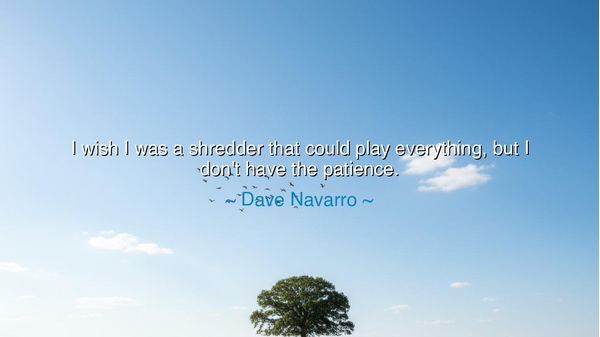
I wish I was a shredder that could play everything, but I don't






Dave Navarro, guitarist of fire and shadow, once declared with a mixture of humility and longing: “I wish I was a shredder that could play everything, but I don’t have the patience.” In this confession lies a timeless truth: that mastery of any craft is not given by desire alone, nor by raw talent, but by the slow and steady discipline of patience. Navarro, whose art already moves hearts with power, admits that even he gazes upon the unreachable horizon of perfection and sees the one thing that holds him back—not skill, not spirit, but the endurance to walk the long road of practice.
The shredder, in the world of music, is the warrior of strings, the one whose fingers fly like lightning across the fretboard, summoning sounds that defy belief. To shred is to conquer the instrument, to bend it into submission through hours upon hours of unyielding practice. Navarro admires this, yet acknowledges his limit. In doing so, he reveals the eternal paradox of artistry: we may yearn for mastery in every direction, but no one soul can contain it all. What matters is not the ability to play everything, but the wisdom to embrace one’s own voice.
History echoes this same struggle. Think of Leonardo da Vinci, who longed to master every discipline—art, science, engineering, anatomy. His genius was vast, but even he left many works unfinished, driven by curiosity yet hindered by time and patience. Or recall the tale of Mozart, whose brilliance was effortless in sound but whose life was short, unfinished, imperfect. Perfection is always a horizon, and the journey toward it requires patience greater than desire. Navarro reminds us that wishing is not enough; endurance is the price of mastery.
Yet his words also speak to a deeper wisdom: that to admit a lack of patience is not weakness, but honesty. Too often the world tells us to pursue everything, to achieve all, to master every skill. But the truth is that life requires choice. The artist must sometimes accept that their brilliance lies not in being able to play every note, but in knowing which notes are theirs to play. Navarro’s strength lies not in shredding endlessly, but in shaping music that is raw, emotional, and unforgettable. His limitation becomes his signature.
Consider the Japanese art of haiku. Its masters do not attempt to say everything, but to say much with little. Their patience is not in endless elaboration, but in restraint, in shaping simplicity until it sings. In the same way, Navarro’s admission reminds us that greatness is not always found in doing more, but in refining what one can do well. For patience is not only about endless practice, but also about the patience to accept oneself as one is.
The lesson for us is this: admire those who shred, but do not despair if you are not one of them. Recognize that the road to mastery is paved with patience, and if you seek it, you must commit to the long walk, with all its repetition, failure, and perseverance. But also recognize that if patience is not yet yours, you may still create beauty, so long as you embrace your own voice and give it fully. To envy others is natural, but to live in envy is wasteful. Better to stand in the fullness of your own gift, however imperfect, than to chase endlessly after another’s.
Therefore, O seeker, take Navarro’s words to heart. If you desire mastery, cultivate patience, for there is no other path. But if patience eludes you, do not let that desire steal your joy. Honor the craft you already carry, refine the voice that is uniquely yours, and let the world hear it. For in the end, music is not about playing everything, but about playing truly. And truth, even when it lacks perfection, carries more power than any shredder’s speed.






AAdministratorAdministrator
Welcome, honored guests. Please leave a comment, we will respond soon